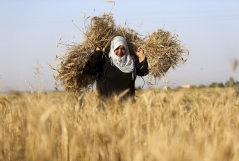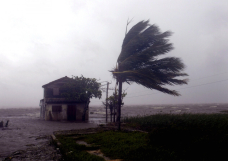Immediately, a man out of the tombs with an unclean spirit met Jesus (Mark 5v2)
How do you cope with all the evil there is in the world today? From the grisly brutalities of Islamic State to the sordid sex crimes of paedophile priests there is much that is deeply disturbing.
Many people effectively ignore it. Sedated by reality television and bathed in the saccharine banality of social networking, life passes in a flurry of first-world activities and minor difficulties which shut out the harsher realities of the planet.
Others feel strongly about the wickedness they see but lack any framework with which to tackle it. For many without a faith, the absence of any absolute moral touchstone leaves them floundering to define what is really right or wrong, as Tim Keller has demonstrated in The Reason for God.
But Jesus confronts evil head on – even the worst sort of terror once summed up with icy simplicity by Joseph Conrad in the novel Heart of Darkness with just four words: "The horror, the horror."
As we continue our fortnightly journey through Mark's Gospel and reach chapter 5, we find Jesus stepping out of a boat that has just been through a storm. He has scarcely caught his breath before "immediately a man out of the tombs with an unclean spirit met him" (v2).
The man confronts Jesus. A brief conversation ensues. The man states he is possessed by many spirits ("My name is Legion") and Jesus sends them into a herd of pigs who rush headlong into a lake where they drown. It's a dramatic incident. But what do we learn?
1. The reality of the occult: For many non-Christians, the idea of the demonic is laughable. Some Christians, by contrast, seem over-obsessed with it. As CS Lewis wrote: "There are two equal and opposite errors into which our race can fall about the devils. One is to disbelieve in their existence. The other is to believe, and to feel an excessive and unhealthy interest in them."
Jesus himself certainly believed in and taught about the reality of the Satanic. Moreover, many of us in ministry will have seen enough to convince us – and be quite clear too about how it differs from mental illness or purely human wickedness. In this particular incident, the fact that "a great herd of swine" is possessed and rush down a steep bank as soon as the man is healed would appear to indicate he had been freed from something other than simply psychiatric or social problems.
2. The authority of Jesus:Jesus commands – and the demons flee. We are not all called to what is today called "deliverance ministry" but we are all called, in the name of Christ, to oppose evil in its many forms – whether in resisting sin in our own hearts, or praying against "principalities and powers", or combating injustice. Sometimes these things are inter-linked; but whatever the situation, at the end of the day, Jesus is stronger than evil and will ultimately triumph.
3. When evil is confronted, the disturbed are comforted – but the comfortable are disturbed: At the end of this episode, the possessed man is "clothed and in his right mind" with a testimony of "how much the Lord has done" for him. By contrast, the pig-owners are deeply unsettled and "beg Jesus to leave their neighbourhood". It seems they would have preferred to keep their livelihood – and let the man remain afflicted.
And what about us? Does evil in our own hearts disturb us enough to bring it to Christ to receive his help and comfort? Does the evil we see in the world outrage us enough to be prayerfully and actively engaged – even when it brings hostility from the vested interests which will inevitably be threatened?
Or is it much more comfortable, like the disquieted swineherds, to try and shut Jesus out of our lives – and out of the public sphere?
The Rough Guide to Discipleship is a fortnightly devotional series. David Baker is a former daily newspaper journalist now working as an Anglican minister in Sussex.















